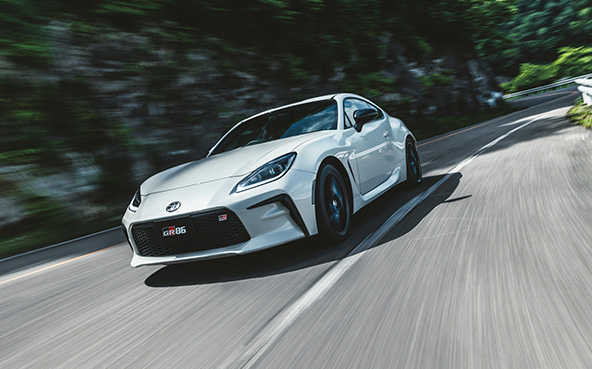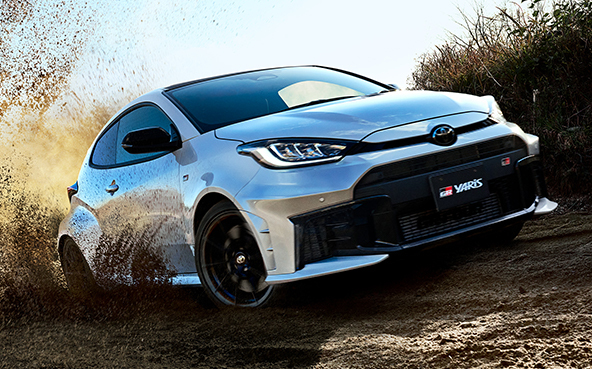TOYOTA GAZOO Racing (TGR) held the world premiere of its evolved GR Corolla, which leverages insights gained by competing in motorsports, in California, USA, on August 1 (local time). Rollout beyond North America is now being considered.

The Corolla—such as demonstrated by the TE25 Corolla, which achieved Toyota’s first World Rally Championship victory*1 in 1973, and the TE27 Corolla Levin, which won the 1000 Lakes Rally*2 in 1975—is a model with driving performance that has been honed and evolved through participation in motorsports. At the same time, against a backdrop of responding to customers’ diverse usage styles and needs, which change with the times, the Corolla has continued to evolve into a variety of forms—sedan, station wagon, hatchback, coupe, and SUV—earning the support of many people around the world. The birth, in 2022, of the GR Corolla stemmed from the strong desire of Toyota President Akio Toyoda, a.k.a. Morizo, to “awaken the Corolla’s DNA as a sports car and bring back a Corolla that captivates our customers”. With participation in motorsports continuing following the launch of the first generation, lessons learned were fully applied to an enhanced model that came out last year.
The evolved GR Corolla leverages insights gained by competing in motorsports events such as the Super Taikyu Series for improved high-speed cornering, acceleration, and cooling. It is also available with the newly developed 8-speed GAZOO Racing Direct Automatic Transmission featured in the evolved GR Yaris. Based on feedback from Hiroaki Ishiura and other professional race drivers, in-house evaluation drivers, and Toyota Master Driver Morizo, development pursued instilling in the vehicle untamed energy that makes one want to keep on driving, whether at the limit or in everyday use.
By participating in motorsports using the GR Corolla, TGR intends to keep on pursuing intuitive handling and instinctive responsiveness along with untamed energy that captivates drivers.
■ Key innovations
1. Further pursuit of untamed energy
Evolution of cornering performance
- The front and rear shock absorbers now have built-in rebound springs for better vehicle posture and inner-wheel ground load characteristics, thereby improving vehicle stability during cornering.
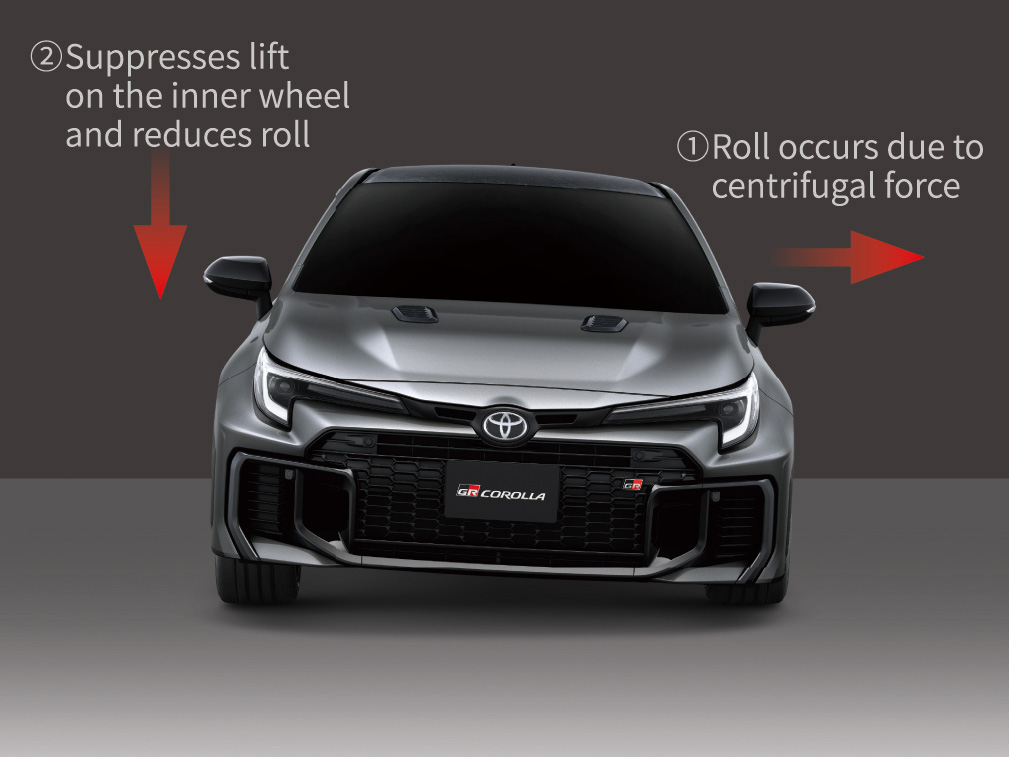
- The trailing arm mounting point, which is conventionally the center of rotation of the rear axle, has been raised to reduce rear sagging during acceleration. The resulting suppression of vehicle posture change due to accelerator operation heightens driving force response and enables stable cornering.
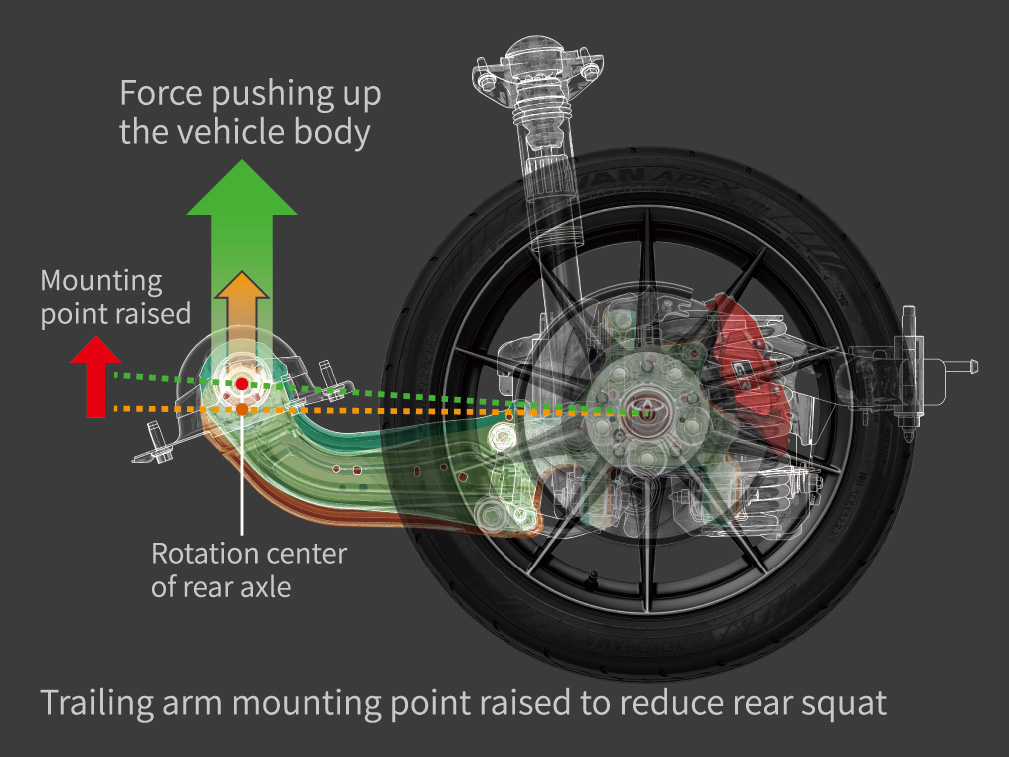
- The spring characteristics of the rear coil springs and stabilizer bar have been revised to optimize how each contributes to roll stiffness, improving the ground-gripping performance of the rear tires during cornering and enhancing vehicle controllability.
Evolution of acceleration performance
- Based on an analysis of the range of engine usage during sports driving, mid-speed engine torque, which is key for accelerating out of corners, has been increased by 30 N・m compared to the current model, raising the maximum torque to 400 N・m.
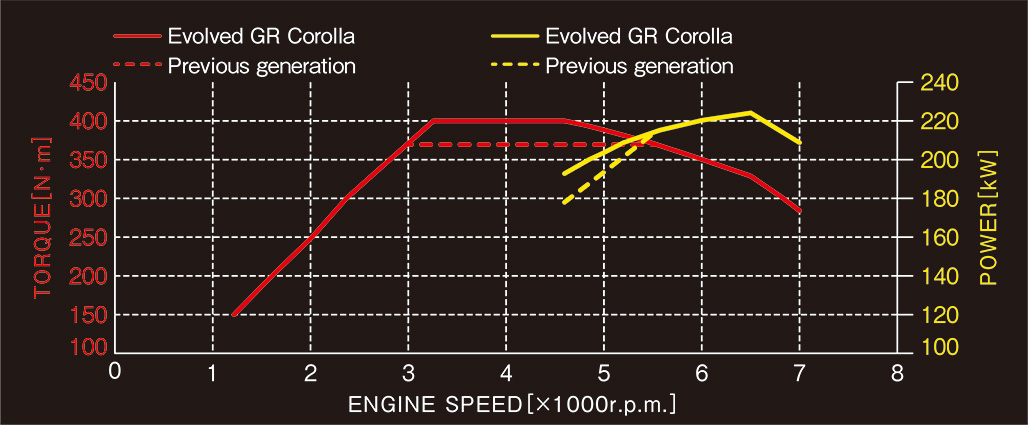
- The car is equipped with the newly developed 8-speed GAZOO Racing Direct Automatic Transmission, which aims to achieve world-class shifting speeds and is featured in the evolved GR Yaris. Whereas gear changes are conventionally based on vehicle conditions such as deceleration and vehicle speed, the GAZOO Racing Direct Automatic Transmission, to better reflect the driver’s intentions, closely monitors brake application and release as well as accelerator operation, allowing it to anticipate driving conditions and, thus, deliver gear selection timing on par with that by professional race drivers. Freed from worrying about shifting gears, the driver can concentrate on steering and operating the accelerator and brake pedals for a more enjoyable sports-driving experience.
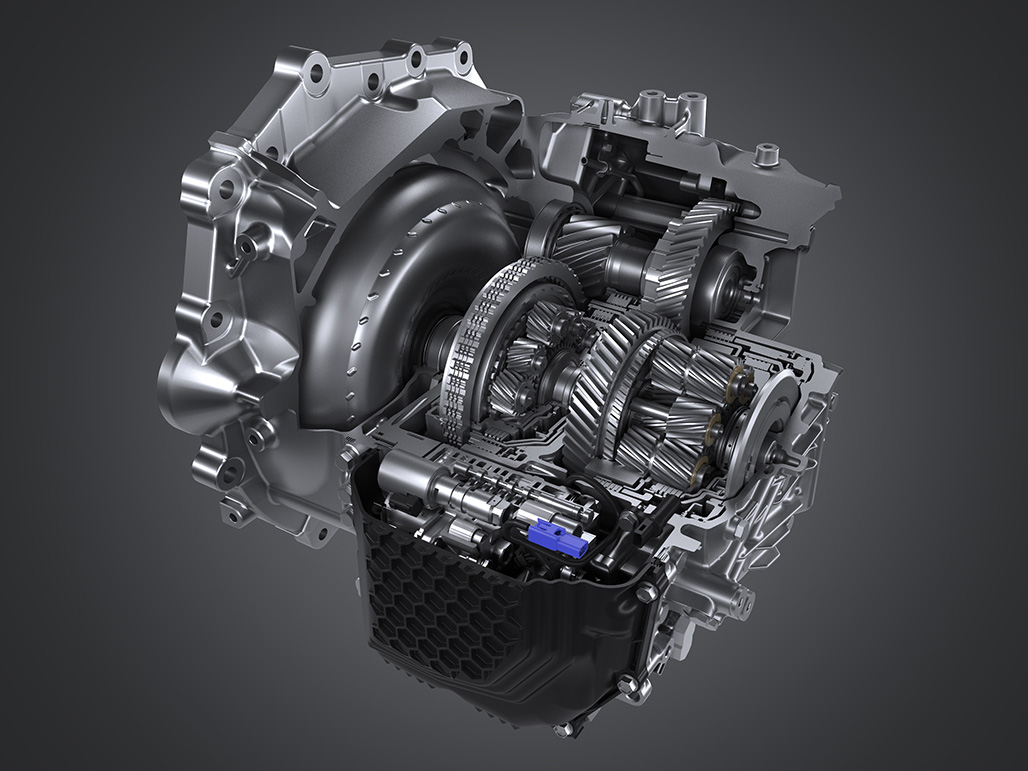
Evolution of cooling and aerodynamic performance
- GAZOO Racing Direct Automatic Transmission-equipped vehicles come standard with an air-cooled automatic transmission fluid (ATF) cooler in addition to a water-cooled ATF fluid warmer and cooler that also promotes engine warm-up. Also, with an eye toward sports driving, an added sub-radiator*3 enhances engine cooling.
- An air intake opening in the lower grill helps cool the air-cooled ATF cooler. The intake opening teams up with an air exhaust opening in one of the front bumper’s side ducts to smoothen cooling air discharge.
- To ensure a more stable braking force, brake ducts direct airflow to the front brake rotors for a greater cooling effect, suppressing increases in brake temperature.
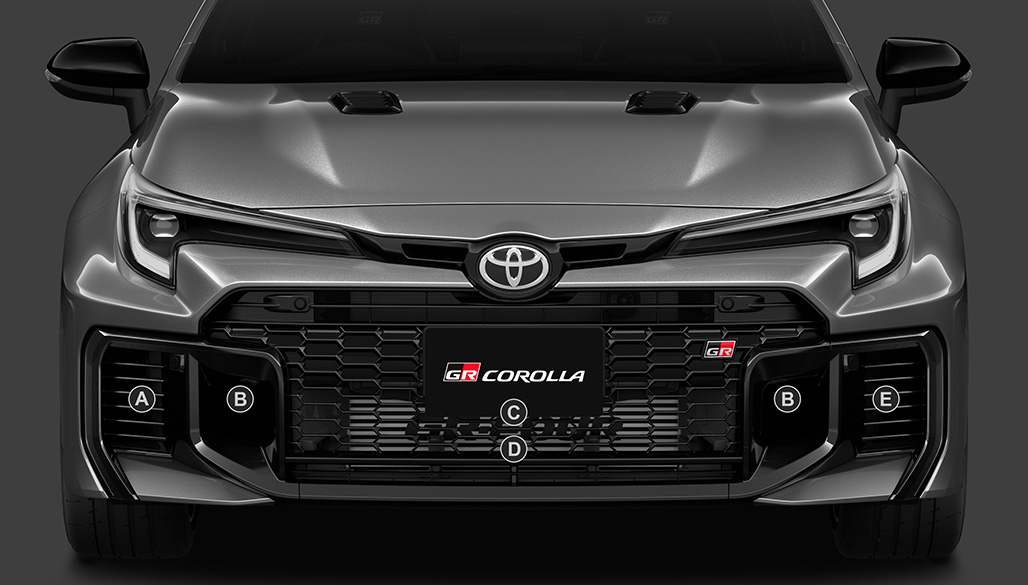
B Brake duct
C Radiator grille
D Intercooler
E Air-cooled ATF cooler (Standard on GAZOO Racing Direct Automatic Transmission vehicles)
- Minuscule surface height variations in the corners of the front bumper generate a minute current of stable turbulence that suppresses air separation from the bumper corners. Such features help ensure driving stability even though various mechanisms necessary for enhanced cooling performance have been added.
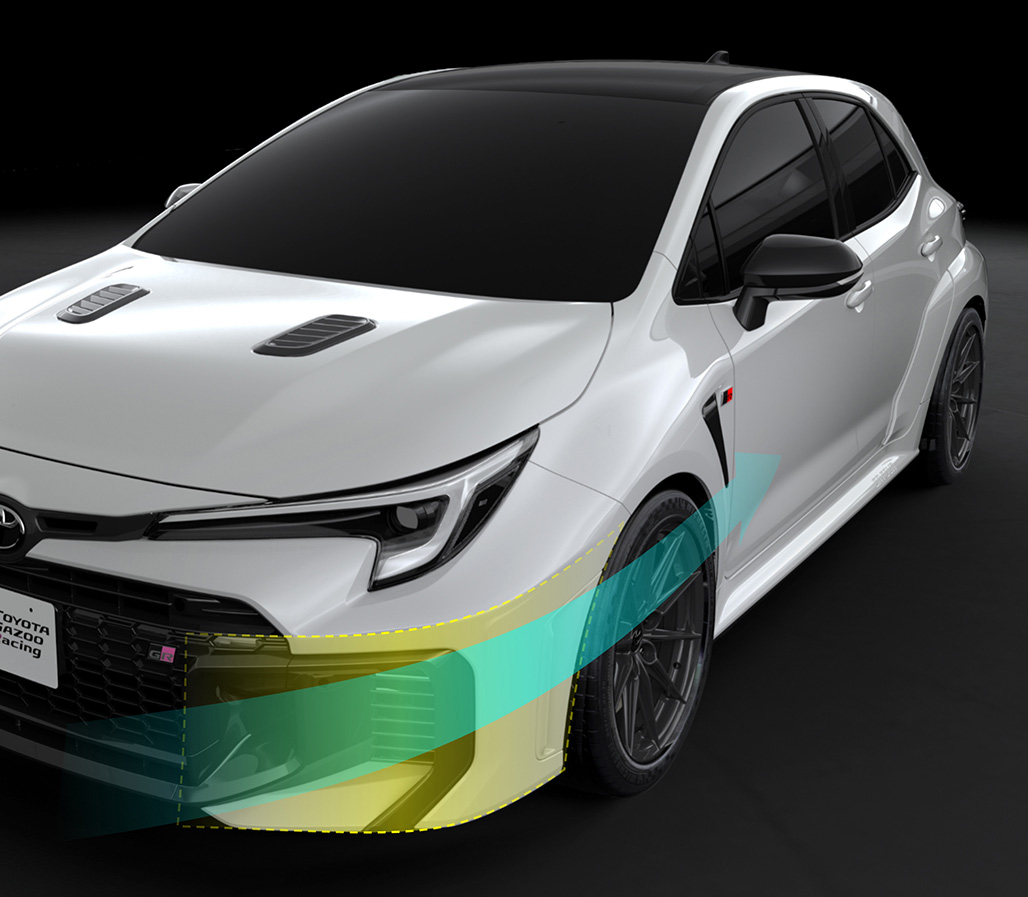
- Side ducts aid in smooth air discharge. Their protruding shape was calculated to allow air discharged from the ATF cooler to flow rearward without disturbing airflow on the sides of the vehicle.
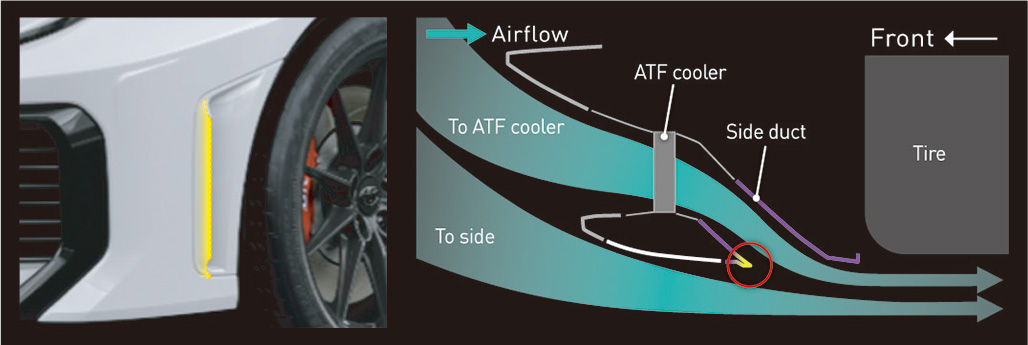
Evolution of deceleration performance
The anti-lock braking system (ABS) has been improved to create a safe and secure vehicle with the highest tolerance possible even when driving at the limit. Up-and-down G sensors monitor the ground contact load of the wheels during ABS activation, ensuring stable braking force when the system is activated.
Evolution of a sense of oneness with the vehicle
- Grooved washer bolts with a high level of fastening rigidity connect the steering column and instrument panel reinforcement for improved straight-line stability and a more direct steering feel.
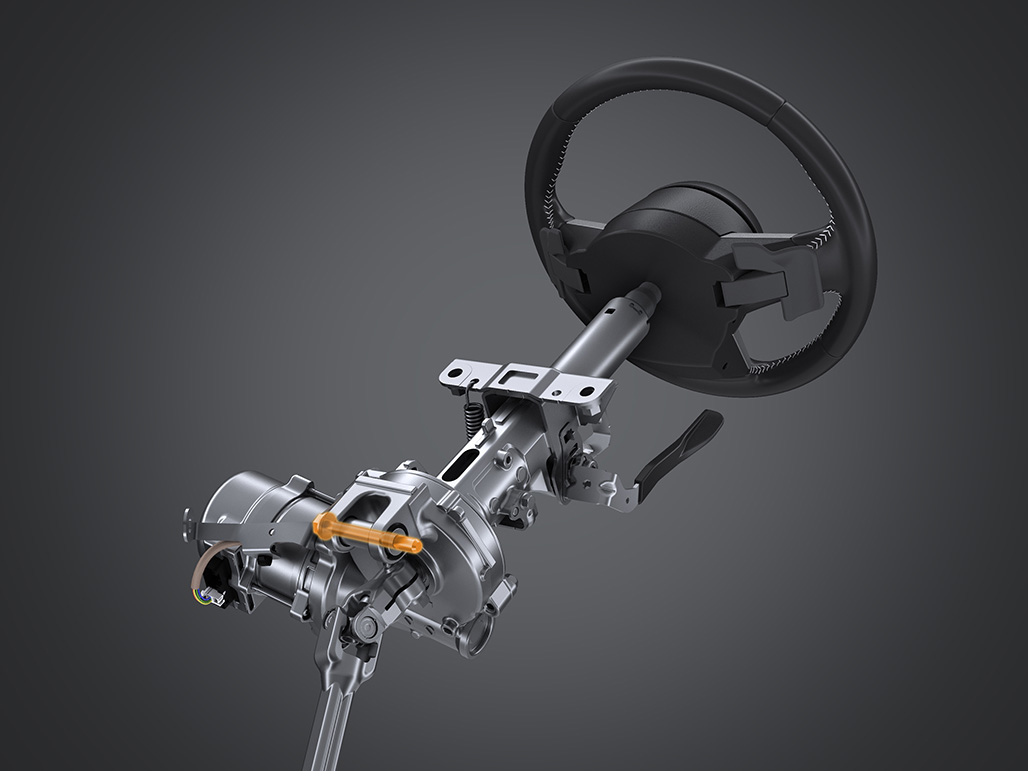
- Selected chassis components are also fastened using special bolts with a high level of fastening rigidity. Such bolts fasten the lower arms and lower ball joints for improved steering response. They also fasten the rear shock absorbers to the body for improved rear grip response to steering.
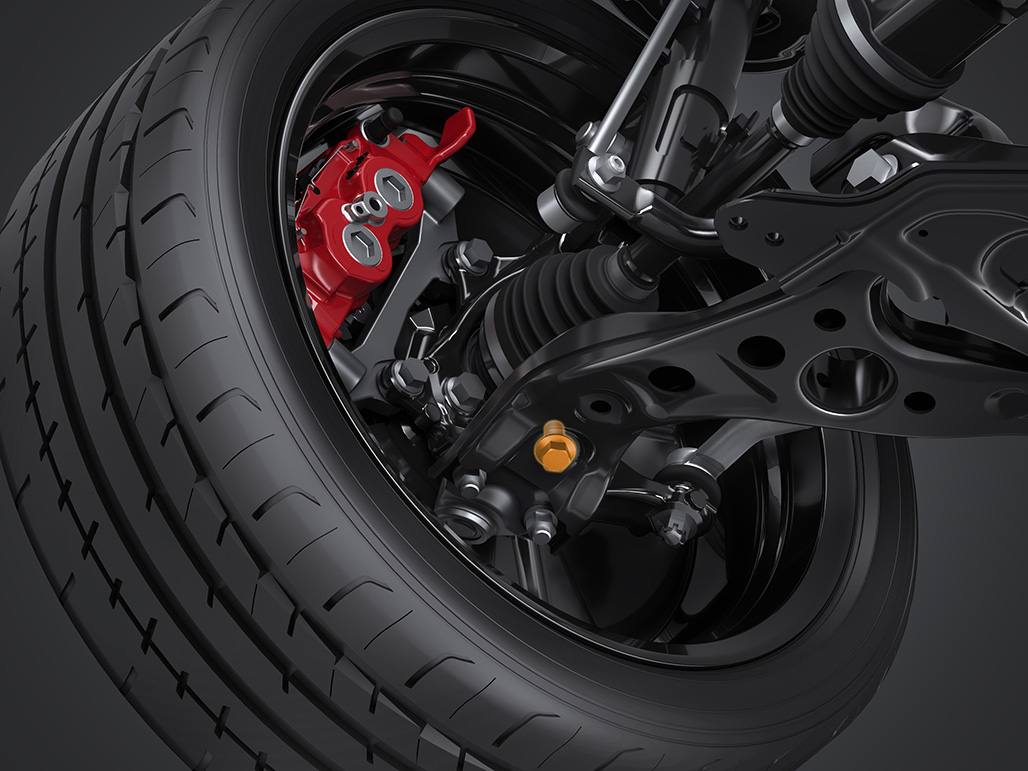
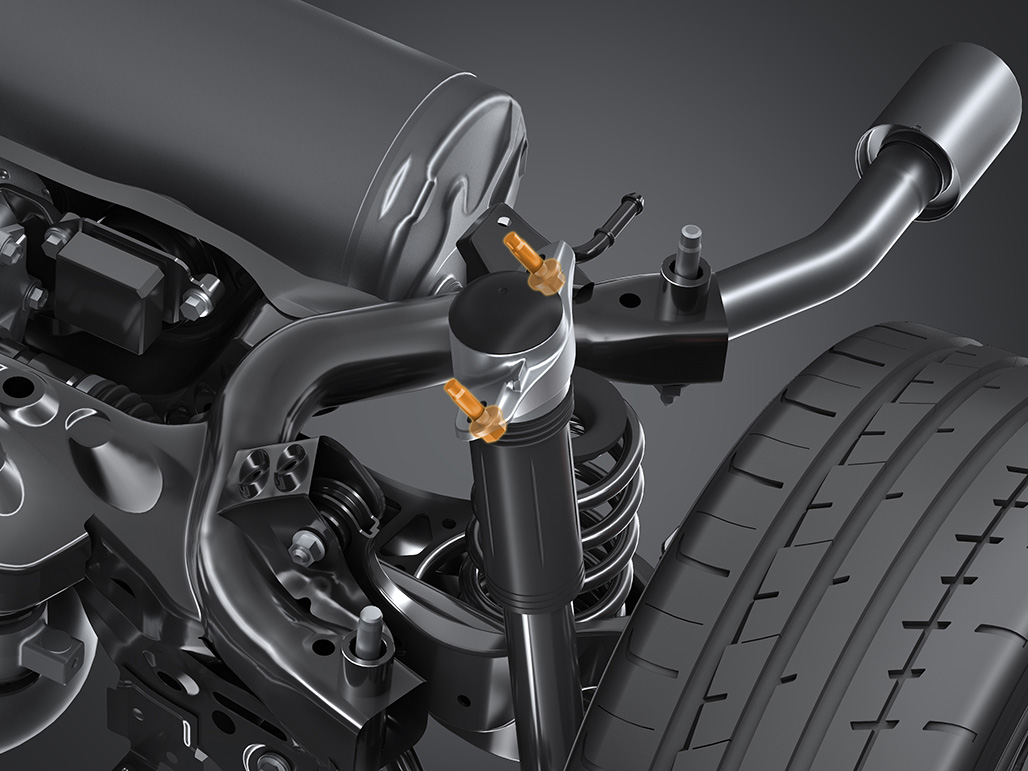
- Clutch pedal operability has been improved by optimizing the clutch system’s total lever ratio, clutch cover, and turnover-spring load characteristics. Peak pedal force has been set higher to provide a satisfying feel to pedal operation, and post-peak pedal force along the length of the pedal stroke has been reduced to improve the feel of full pedal application. Clutch characteristics have been optimized to provide an even sportier feel, with increased load upon pedal release for improved foot-following response and shorter half-clutch stroke for improved operability.
▼ Evolved GR Corolla Premium Plus (U.S. market specifications) main specifications
| Length | [mm] | 4,410 |
|---|---|---|
| Width | [mm] | 1,850 |
| Height | [mm] | 1,480 |
| Wheelbase | [mm] | 2,640 |
| Track (front/rear) | [mm] | 1,590/1,620 |
| Occupancy | 5 | |
| Weight | [kg] | 1,500 (1,520 for GAZOO Racing Direct Automatic Transmission-equipped model) |
| Engine | In-line 3-cylinder with turbo and intercooler | |
| Type | G16E-GTS | |
| Bore x stroke | [mm] | 87.5 x 89.7 |
| Displacement | [liters] | 1.618 |
| Max. output | kW (PS)/rpm | 224 (304)/6,500 |
| Max. torque | N・m (kgf・m)/rpm | 400 (40.8)/3,250–4,600 |
| Transmission | iMT (6-speed manual transmission) or GAZOO Racing Direct Automatic Transmission (8-speed automatic transmission) | |
| Driveline | GR-FOUR 4WD system Electronic multi-plate clutch 4WD (with 3 selectable modes) | |
| Differentials | Front | Torsen®*5LSD |
| Rear | Torsen®*5LSD | |
| Suspension | Front | MacPherson strut |
| Rear | Double wishbone | |
| Brakes | Front | Ventilated disk (18-inch aluminum, opposed 4-pot calipers) |
| Rear | Ventilated disk (16-inch aluminum, opposed 2-pot calipers) | |
| Wheels | 18-inch matt black 15-spoke cast aluminum | |
| Tires (front/rear) | 235/40R18 Michelin Pilot Sport 4 | |
| Fuel tank capacity | [liters] | 50 |
*1 In the Press on Regardless Rally held in the United States
*2 The current Rally Finland
*3 The U.S. market specification vehicle comes in three trim levels: Core, Premium, and Premium Plus. The sub-radiator is standard on the Premium Plus and available as a factory-installed option on the Core and Premium.
*4 The image is of a prototype. Final specifications might differ.
*5 Torsen® is a registered trademark of JTEKT Corporation.





